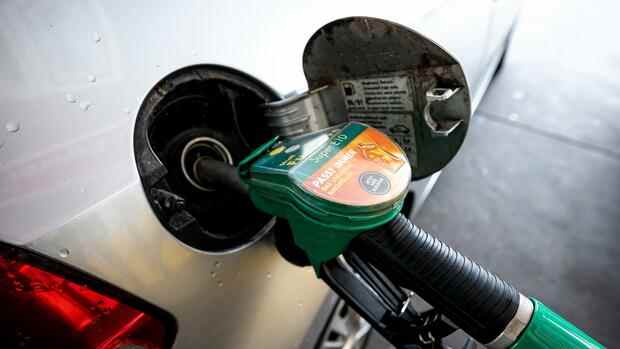Fuel prices in Germany are getting higher and higher. The Ukraine crisis is further heating up the energy problem.
(Photo: dpa)
Berlin Before the traffic light coalition started deliberations on steps to counter high energy prices, a dispute broke out about a possible increase in the commuter allowance. The deputy SPD chairwoman and Saarland Economics Minister Anke Rehlinger had spoken out in favor of raising the flat rate. Green leader Omid Nouripour rejected an increase. This is not a contribution to climate protection and not feasible with the Greens, he said.
Even the Federation of German Consumer Organizations (VZBV) thinks little of the SPD proposal. “High-income households in particular benefit disproportionately from the commuter allowance. This means that people with less in their wallets are reimbursed less,” said the team leader for mobility and travel at VZBV, Marion Jungbluth, the Handelsblatt. Low earners are hit harder by the “price shock at the petrol pump” than the rich or people with a company car and fuel card. “This social injustice is exacerbated with every cent more commuter allowance.”
In the afternoon, the governing coalition wants to discuss how consumers can be relieved of the high energy prices. The chairman of the SPD, Lars Klingbeil, had announced a “comprehensive relief package” at the beginning of the week. However, it is still unclear what exactly that will look like.
In addition to the SPD, the Federal Minister of Finance and FDP leader Christian Lindner had also discussed an increase in the distance allowance. Union-led countries are also calling for a significant and early increase in the flat rate in order to relieve people in rural areas in the face of sharply increased fuel prices.
Top jobs of the day
Find the best jobs now and
be notified by email.
From Jungbluth’s point of view, a mobility allowance that is independent of income would be socially fairer. “In contrast to the commuter flat rate, the same amount per kilometer would be deducted from the tax liability for all commuters,” explained the VZBV expert. “The relief would be independent of the individual tax rate.”
Consumer advocates for “targeted concepts instead of simple quick fixes”
Mobility must remain affordable, stressed Jungbluth. Only those who are mobile can participate in economic and social life. The federal government must therefore react “with targeted concepts instead of simple quick fixes”.
More about the energy transition:
The tax office currently recognizes a distance allowance of 30 cents per kilometer of one-way distance for trips to the first place of work per actual working day. From the 21st kilometer there will be 35 cents since 2021. At the beginning of 2024, it should be 38 cents per kilometer from the 21st kilometer.
The distance allowance is independent of the respective means of transport. If income-related expenses total more than EUR 1,000 per year, the tax burden can be reduced with every EUR above that. However, many commuters travel less than ten kilometers from home to work every day. They then hardly benefit because the amount is within the employee lump sum.
According to earlier figures from the Federal Statistical Office, in 2017 around 18.4 million commuters stated that they drove at least part of the way to work by car. That corresponded to a share of 88 percent. It was also said that around 7.5 million commuters had a commute of more than 20 kilometers in 2017.
Greens warn against distribution of “expensive tax gifts”
The Union demands that the flat rate should be increased to 38 cents per kilometer and “dynamically” further developed depending on the applicable CO2 price. The IG BCE union is proposing an increase to 40 cents per kilometer for the 2022 tax year.
The consumer advocate Jungbluth was convinced: “A socially just reform of the commuter allowance can also increase the acceptance of climate protection measures.” In addition, easily accessible, reliable and attractive alternatives to commuting by car should be created, Jungbluth added. “In order for the climate and transport turnaround to succeed, everyone must be taken along.”
The Greens’ chief housekeeper Sven-Christian Kindler warned against the distribution of “expensive tax gifts” with a view to a possible increase in the commuter allowance. A viable relief package includes the immediate surcharge for children from poor families, a fair distribution of the CO2 price between landlords and tenants for heating costs and a one-off payment for people with basic security, said Kindler of the “Augsburger Allgemeine”.
The financial policy spokesman for the SPD parliamentary group, Michael Schrodi, also expressed skepticism about raising the distance allowance. “There are other options on the table.” He prefers direct payments, which help people quickly, said Schrodi.
More: Robert Habeck: The EEG levy is to be abolished as early as this summer
